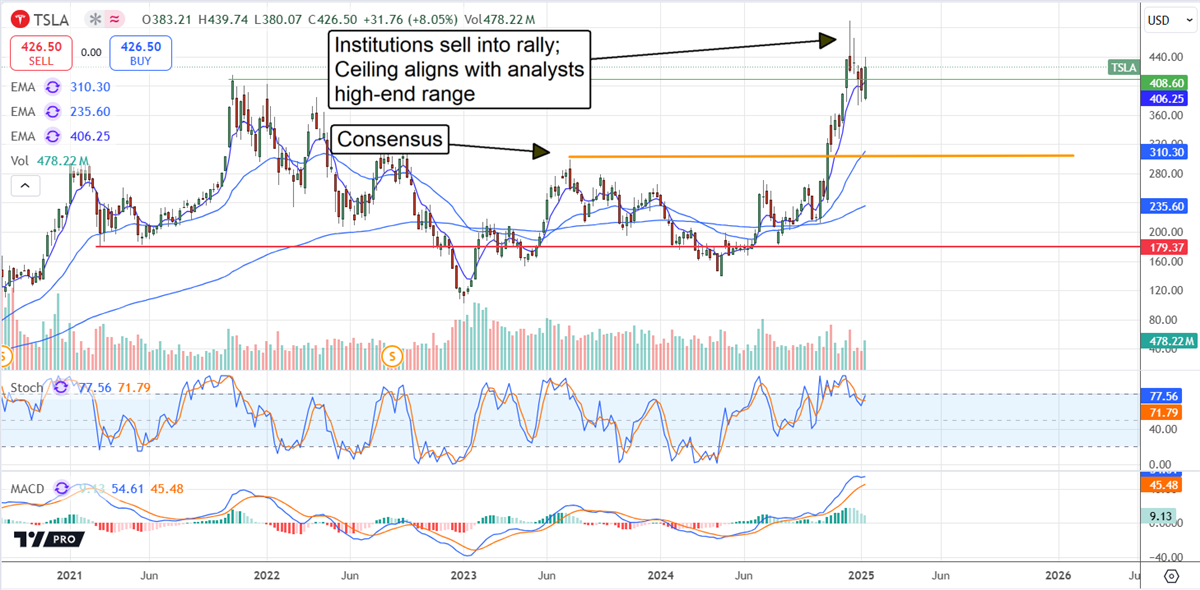
Tesla, Inc. (NASDAQ: TSLA)’s Cybertruck discounts are bad news for the stock price. The company announced a series of discounts in early January that suggest tepid demand in what should be a growth driver. The news includes shifting workers to other lines, indicating no pick-up in demand is expected. The takeaway is that the leading EV manufacturer faces increasing competition and will likely report another annual decline in total vehicle deliveries while the remainder of the industry grows.
The outlook for Q4 and 2025 is optimistic despite the downtrend in revisions. The analysts expect revenue growth to accelerate sequentially and year over year, topping 15% in 2025. Growth drivers will include power generation and services, but weakness in the core automotive unit will offset them. Headwinds to growth include the higher-for-longer interest rate environment, affordability, and policy. President Trump is expected to quash OEM and consumer incentives for EVs early in his administration, increasing hurdles and slowing demand.
The Analysts Remain Hopeful; Lift Targets for 2025 But Gains Are Capped
The analysts are hopeful for Tesla’s success in 2025 and have been lifting sentiment and price targets over the past two months. However, the consensus sentiment tracked by MarketBeat remains a Hold, with 22.5% of analysts rating it as Sell, and the price target is lagging behind the action. The consensus in mid-January assumes a 30% downside from critical resistance targets, and a deeper downside is possible. The $300 level coincides with the mid-point of a trading range and would be a significantly bearish signal if crossed. Regarding the analyst's high-end range, it aligns with the 2024 stock price highs, creating a ceiling for the market.
Among the headwinds are sales in China, the company’s second-largest market, at roughly 37% of 2024 revenue. Sales grew by 8.8% last year, but factors like price cuts and lost market share offset it. The company’s market share dwindled from 7.8% in Q1 to 6% in Q3 and will likely continue to fall because of increased competition. Local automakers are set to benefit from the dual impact of stimulus at home and tariffs abroad, leaving Tesla to struggle. Analysts cite factors such as an aging portfolio as a curb on demand, and no new models are likely to drive business.
The most likely release is the Model Q sometime this year, likely the first half, but no real indication has been given. The odds are high that the company will release a compact vehicle; the question is when, how much it will cost to make, and demand. While an innovation, the Model Q will be more of a novelty than a growth driver; the car will have limited seating, cargo room, and range, making it less-than-ideal for most purposes.
Institutions Cap Tesla Gains in January
Institutions bought Tesla stock on balance for all four quarters of 2024, but the trend shifted at the end of the year and carried into the first two weeks of January. The data tracked by MarketBeat shows that sales in January’s first two weeks doubled the buying volume, aligning with the recent market top. The institutions own more than 65% of the stock, so selling will be a strong headwind for the stock price if it continues.
Volume is another concern for Tesla bulls. A volume spike accompanies the 2024 market surge, but the total volume and the spikes are trending lower over time. The volume in early January was down 15% from 2024, significantly lower than the prior year, as retail investors lost interest in the opportunity. With no bullish catalysts expected soon and plenty of risk, the volume will likely trend lower in 2025, increasing the potential for outsized market movement and volatility.















